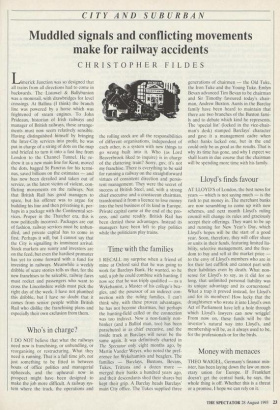CITY AND SUBURBAN
Muddled signals and conflicting movements make for railway accidents
CHRISTOPHER FILDES
L'merick Junction was so designed that all trains from all directions had to come in backwards. The Listowel & Ballybunion was a monorail, with drawbridges for level crossings. At Ballina (I think) the branch line was powered by a horse which was frightened of steam engines. To John Prideaux, historian of Irish railways and manager of British railways, these arrange- ments must now seem relatively sensible. Having distinguished himself by bringing the Inter-City services into profit, he was put in charge of a string of dots on the map and briefed to turn it into a fast line from London to the Channel Tunnel. He re- drew it as a new main line for Kent, moved the dots, bagged St Pancras for his termi- nus, saved billions on the estimates — and has now been derailed and taken out of service, as the latest victim of violent, con- flicting movements on the railways. Not that British Rail has good managers to spare, but his offence was to argue for building his line and then privatising it, per- haps in a package with the Continental ser- vices. Proper in the Thatcher era, this is now politically incorrect. Packages are out of fashion, railway services must be unbun- dled, and private capital has to come in first. Perhaps it will, but I cannot say that the City is signalling its imminent arrival. Stock markets are sunny and investors are on the feed, but even the hardiest promoter has yet to come forward with a fund for investing in railways. Meanwhile a weekly dribble of scare stories tells us that, for the new franchises to be saleable, railway fares must rocket and passengers who want to cross the Lincolnshire wolds must pick the right day of the week. I have not plumbed this dribble, but I have no doubt that it comes from senior people within British Rail who dislike the franchising plans and especially their own exclusion from them.


















































 Previous page
Previous page